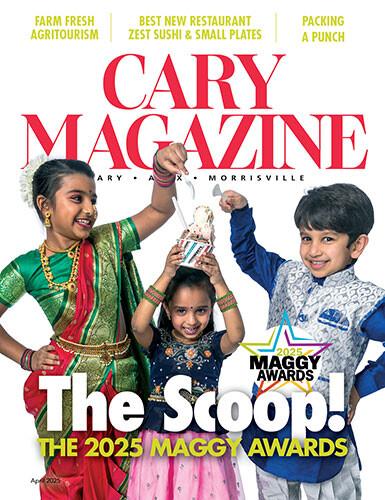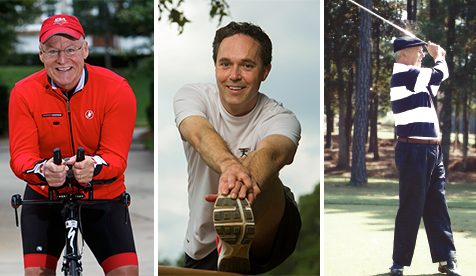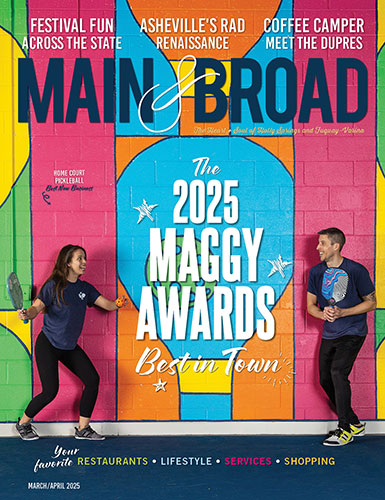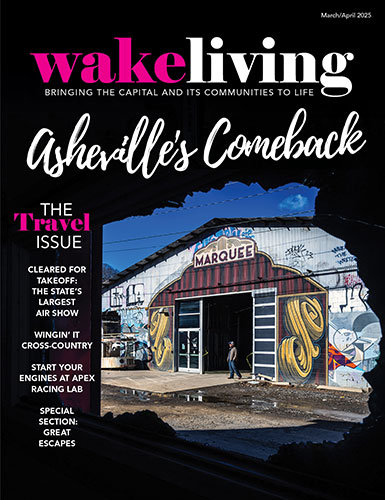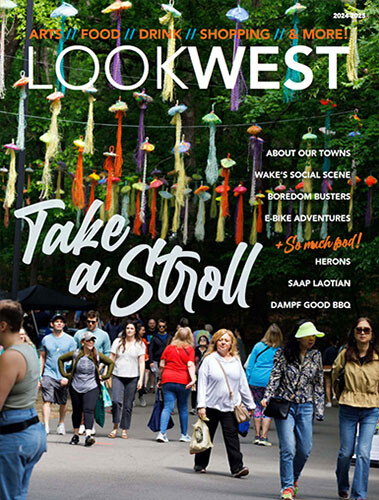Appreciation is easy; just a nod, a couple of words or a quick note can express it.
But every once in a while, the gift is so extravagant that words fail to convey the depth of gratitude. Other times, the gift is given by so many people that individual thanks are impossible. Then, the only thing to do is share that monumental gift, that bit of grace, with others.
The following three men have each received great things, and have chosen to give back to the community or to others in need. For that, we now say, “thank you.”
 Dan Matthys
Dan Matthys
By the time Dan Matthys was 19, he had undergone six open heart surgeries — the last of which nearly killed him. Although he recovered, the emotional scars lingered.
“I was deathly afraid of going through another heart surgery,” said Matthys, 42, development liaison with the Town of Cary. This fear was not unreasonable, as a congenital heart defect had kept him in and out of hospitals for most of his childhood.
But thanks to an innovative medical procedure, Matthys isn’t afraid anymore.
“It really gave me new hope again; it gave me a new outlook on life,” he said. “They didn’t just fix me physically. They really fixed me mentally — to not be afraid, to not let this heart defect control my life. I’m out playing hockey twice a week. I’m out playing volleyball. I’m jogging with my kids, going to the gym. I live life again.”
In 2006 sympathetic doctors at Duke Medicine helped enroll Matthys in clinical trials for a new therapy, Transcatheter Pulmonary Valve Replacement, at Boston Children’s Hospital. Instead of open heart surgery to replace Matthys’ failing heart valve, a new artificial valve was inserted through a vein in his leg. He was back on his feet within days of the minimally invasive procedure. And he knew he had to find some way to share his transformational experience.
 “I really wanted to give back, to let other people see what’s out there, to see the options,” he said.
“I really wanted to give back, to let other people see what’s out there, to see the options,” he said.
In 2012 Matthys founded Advancing the Heart, which funds innovation in cardiac technology, education and advocacy. Last year the nonprofit raised $11,000 at its annual golf tournament, and this year’s tournament, held Sept. 8, raised $15,000.
Photo Caption: Dan Matthys poses with Maryanne Kessel, executive director of the Herma Heart Center at Children’s Hospital of Wisconsin, during the Advancing the Heart Cardiac Innovation Invitational golf tournament held Sept. 8. Kessel was one of Matthys’ nurses during his frequent stays at Texas Children’s Hospital in Houston. “She was one of my nurses who nurtured me as a child growing up in Houston,” says Matthys.
As an advocate for the procedure that changed his life, Matthys speaks to heart patients across the country. He testified before an FDA review panel about the valve, which gained Humanitarian Use approval in 2010.
He has also found time to fulfill lifelong dreams of skydiving and cage diving with great white sharks.
“All growing up, I never went to P.E. or played in any organized sports,” Matthys said. “I never got to do the stuff that normal kids did. I want to do it now. … I know when it’s time to step back, to take a break, but I’m not going to let it stop me from enjoying life.”

Skydiving was one of Dan Matthys’ lifelong dreams, which he was able to fulfill in 2009.
He remains inspired by everyone who has supported him. After his wife, Heather, and his family, Matthys praises his doctors, his nurses, and especially the Medtronic engineers who developed his heart valve, calling them his superheroes.
“The selflessness of others really keeps me going,” he said. “I look at my wife and everything she’s sacrificed for us, our family. How could I not do something for others as well?”
For more on Advancing the Heart, see advancingtheheart.org.
 Bob Butler
Bob Butler
In May 2012, Cary entrepreneur and triathlete Bob Butler suffered a severe stroke which left him in intensive care, unable to move the right side of his body.
But within five months, Butler was back on the bicycle, whooping with childlike joy.
Now two years into his recovery, Butler wants to help other stroke victims. First he wants to demonstrate that normal activity is possible; then he wants to see it become probable.
Photo Caption: Bob Butler crosses the finish line in July 2013 after completing his first triathlon after his stroke.
“I really wanted to give back,” he said. “I’ve always been generous with my success, but being generous isn’t the same as wanting, at the core, to help people.”
Before his stroke, Butler was leading an independent digital publishing company based in Morrisville. His packed résumé also includes stints as chief operating officer for Lexis/Nexis, founding member of Cary’s Economic Development Commission, and alternative fuels expert.
 “This changed me,” Butler said of his stroke. “I finally became the man I always pretended to be. I was able to not succumb to fear; I was able to overcome horrendous odds. I did need other people. I did appreciate their help. I was thankful for my blessings.”
“This changed me,” Butler said of his stroke. “I finally became the man I always pretended to be. I was able to not succumb to fear; I was able to overcome horrendous odds. I did need other people. I did appreciate their help. I was thankful for my blessings.”
Butler is vocal in his appreciation for his wife, Karen, a physical therapist, and the health care professionals who have supported him: His doctors at WakeMed, the physical therapists at WakeMed Rehabilitation Hospital and STEPS for Recovery in Cary, Dr. David Pascal, a specialist in sports medicine who also treats Olympic athletes, and especially the unexpected support of his neighbors in Prestonwood.
“Over the course of about six months, everybody became a fan of my recovery,” he said. “I didn’t know any of their names. They’d say, ‘Hey Bob, you’re doing great, can’t believe your progress’… It became so motivating.”
Now Butler can talk for hours. He can run. He competes in triathlons. He still has years of work ahead to restore his damaged muscles, but he is confident he will eventually be back to normal — “ like it never happened,” he said.
Then he plans to officially launch his nonprofit, Overcoming Stroke, by walking into a room full of potential donors who won’t be able to tell which side of his body was affected by the stroke. Butler is betting that his personal story will enable him to raise money for his foundation, to establish grants for doctors and patients so one day normal life after stroke isn’t unusual.
Butler currently shares his story, along with scientific reports regarding stroke, at overcomingstroke.com.

Bob Butler and his wife, Karen, at their home in Prestonwood.
 Carroll Ogle
Carroll Ogle
Carroll Ogle, the Cary businessman and philanthropist who passed away July 1 at age 86, helped shape what we think of as downtown Cary.
Photo Caption: Ogle was a staunch supporter of First Methodist Church in Cary and helped found the church’s annual charity golf tournament to benefit the USO and programs sponsored by the Methodist Men. This photo was taken about five years ago during the tournament, which marked its 20th year in August.
As a mentor, Ogle counseled budding entrepreneurs, and if he felt they had potential he would do whatever it took to get them started.
“He had a tremendous business mind,” said his wife, Sheila Ogle. “If someone was trying to get financing or anything he was like a dog with a bone … He would talk to them about business, how to get funding or how to run their business. “
As a board member and longtime supporter of the Heart of Cary downtown association, Ogle helped promote cooperation between businesses and residents.
“They just wanted something for downtown, to get the merchants and the residents all together,” Sheila said about the early days of the organization.
The couple also championed the preservation of historic buildings in Cary, although Sheila said she had to talk her husband into tackling what would become their home, the Guess-Ogle House on Academy Street. Later they also restored The Matthews House on West Chatham Street.
The Ogles also helped establish the Cary Community Foundation, which gives grants to nonprofits.
“We were trying to teach people that you could be philanthropic without having to be wealthy,” Sheila said. Their interest in preservation inspired the creation of the Carroll and Sheila Ogle Family Fund for Arts and Historic Preservation in Downtown Cary.

Shortly before his death, Carroll Ogle, left, took an airplane ride with family friend Dr. Al Mooney. “Carroll’s wish was to go flying with Al one more time,” says Sheila Ogle. “Al has remarked what a gift it was to him as well to take Carroll. They both look so happy. You can hardly tell how ill Carroll was and what a gift this experience was to the both of them.”
The First Methodist Church in Cary has also benefited from Ogle’s time and energy. He was one of the founders of the church’s annual charity golf tournament, which benefits the Methodist Men programs and the USO.
This year’s event, held Aug. 25, marked the tournament’s 20th year, and in appreciation of his faithful support, was dedicated to Ogle.
Ultimately, Ogle was successful and wanted others to be successful too.
“He grew up so poor,” Sheila said. “He said the first steak he ever ate was when he joined the Army. He felt he had been blessed in so many ways. He just felt that it should be shared.”

Carroll Ogle pictured in April at the family beach house in Pine Knoll Shores. “We shared so many happy times there,” Sheila says.
